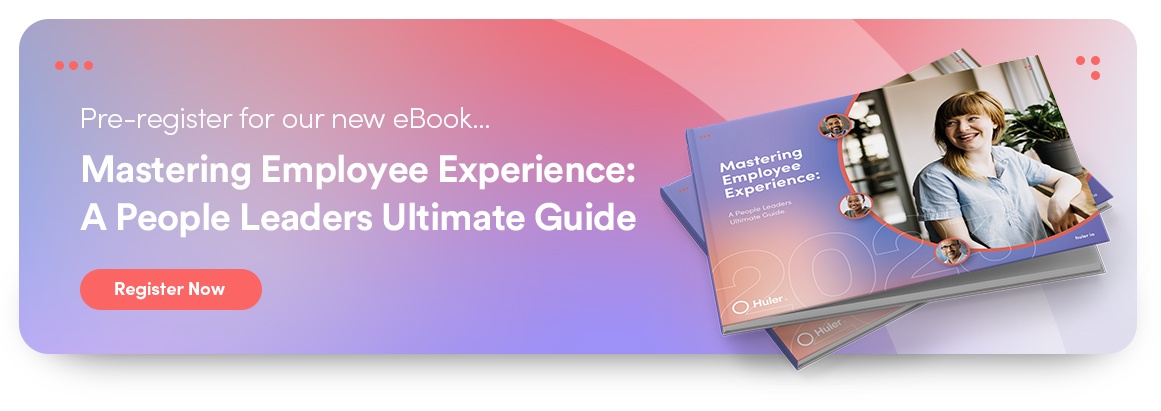It’s been a busy few weeks of events for us at Huler – we’ve been in NYC for WorkX, London alongside St. James’ Palace for the Learning Awards, Minnesota for an employee experience event with Dairy Queen, and most recently we had the pleasure of sponsoring, speaking and exhibiting at the 2023 Learning Technologies UK event.
There’s no denying that the event is a fan favourite amongst Learning and Development (L&D) and HR professionals, boasting an attendance of approximately 9,000 attendees over the course of two days.
We had some great conversations and attended lots of insightful sessions that bought to light the current challenges and trends in the profession right now, and rather than be selfish and keep those insights to ourselves, we’ve put together this short blog which we hope you’ll find useful.
So, if you’re experiencing a bit of the post-event blues, or you didn’t manage to make it and have been struck by the FOMO, grab yourself a cuppa and read on…
AI is changing the game
There was no escaping the topic of AI this year, and judging by the attendance at any session with ‘AI’ in the title, it’s clearly a trending topic amongst the profession, and rightly so, because it’s clear that AI is leading the next learning revolution.
The topics pretty vast and deserves a blog of its own, so for now, we’ve outlined the key advantages we are seeing, or hope to see in the not-so-distant future:
- Metacognition, which allows learners to monitor their own performance and identify their weaknesses.
- Predictive analysis which makes it easy to identify at-risk students and provide personalised interventions to help them improve.
- Automated content creation speeds up the time it takes to create educational content.
- Personalised learning will adapt content to the learner’s needs and preferences, increasing engagement.
- Gamification better engages learners by balancing content with fun.
- Personal learning assistants will improve completion rates by guiding and promoting learners.
- Role-play assessments can be rolled out at scale, allow all learners to be assessed in real scenarios with instant feedback.
Whilst the emergence of AI will improve efficiency and productivity for L&D professionals there are still a lot of ethical and privacy concerns that need to be considered before adopting at scale.
When it comes to engagement, personalisation is key
Engagement was another recurring challenge in the sessions we attended.
It probably comes as no surprise that engagement has seen a considerable drop amongst remote and hybrid workforces, often due to the lack of in-person experiences.
When it comes to learning, approximately 90% of employee learning comes from working alongside peers so we’re going to have to work harder to keep our learners engaged.
Our very own Staff Director, Suzi Archer, took the stand to emphasise how personalisation across the end-to-end employment journey – so that means right from day one when they show an interest in a job opportunity all the way through to offboarding – can not only attract top talent, but keep them engaged and minimise turnover.
How do we do that? Well, take advantage of your data and tech to really personalise the experience and curate customised content right from the moment they log in.
Before you invest in new tech, assess your business needs
Why do so many people attend Learning Technologies UK? Well, the clues in the name. Many attendees are there to find new technologies to solve their current challenges. However, Digital Learning Specialists, Jam Pan, made a great point – there is no point thinking that tech alone will solve your problems.
Tech investment involves a lot of hurdles and long tech cycles, and if you don’t understand your business needs first, you could end up with another clunky platform nobody’s using.
Instead, they recommend you consider the 3 P’s;
People
Who are your people? What do they need? What are they doing? What are they using? What are their challenges? Don’t make assumptions, dig into the data and ask them!
Process
What is your current process? How do you make your tech accessible to employees? How will they adopt it/how do you make it easier?
Platform
What tech do you currently have? How is it currently being used? What does it integrate with? What does your new tech need to be integrated with? Are you making the most of what you have?
Simple means effective
Simplicity and success go hand-in-hand. But in a digital age where we’re bombarded with content and notifications and have access to copious tools, employees are getting frustrated.
There was a resounding agreement that its up to us to take things back to basics and make work and learning as easy as possible by streamlining our tech, tools and content so our people can concentrate on the things that matter most – simple as that.
Be human, even in a digital age
As we’ve just mentioned, hybrid/remote work is creating a pandemic of disengaged employees, combine that with the rise of AI and we’re going to have a big problem on our hands. That is unless we learn how to be more human and truly adopt people-first strategies.
This means we need to do some re-evaluating and consider how we support and care for our people and provide them with the right tools and practices that allow them to feel part of a community and show up to do their best work.
We need to get better at sharing
With employee retention at an all-time low, teams are often being left in the lurch because when their people leave, they take invaluable knowledge with them.
As a result, we need to stop putting all of our eggs in one basket and encourage the sharing of knowledge between teams, but when employees are remote, this makes sharing a lot harder.
Learning Specialists, Engali, shared some great ideas to overcome this:
- Evaluate your tech solutions – how can it help you bring people together?
- Small group learning sessions – use a facilitator and producer to host learning sessions, but keep them small to allow you to foster a community
- Make sharing easier – make it easier to access your tech solutions and share documents etc.
- Create a learning culture – instil a culture of learning and sharing amongst colleagues and sharing of knowledge will happen organically.
If you’d like to find out more about our the sessions and speakers at the event, you can find out more by heading to the Learning Technologies website, or drop us an email at hello@huler.io.





